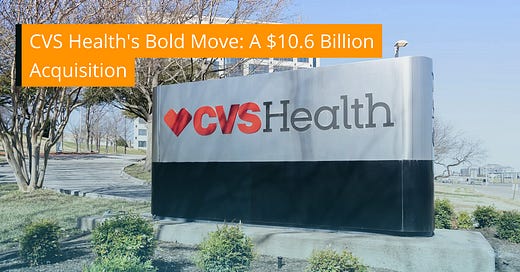More CVS Spending & Heart Transplant Preservation
CVS Health's Bold Move: The $10.6 Billion Acquisition of Oak Street Health and the Future of Healthcare
CVS Health's latest acquisition, Oak Street Health, is a significant move in its goals to expand beyond its roots as a pharmacy and increase its involvement in health services and primary care. The $10.6 billion deal is expected to close in 2023 and will further strengthen CVS' position as a dominant player in healthcare services.
Oak Street Health is a Medicare-focused primary care company that employs over 600 primary care providers and operates 169 senior-focused medical centers across 21 states. The company specializes in treating Medicare Advantage patients and is expected to grow its network of clinics to over 300 centers by 2026. CVS Health's acquisition of Oak Street Health will create a "premier value-based care enterprise" that will provide superior care to many more patients.
The move into primary care follows CVS Health's acquisition of Signify Health, a home health and technology company, for $8 billion in August 2022. With a primary care business, in-home evaluations solutions through Signify, and a retail presence, CVS Health is positioning itself as one of the most dominant forces in healthcare services.
Analysts are generally positive about CVS Health's move into primary care and see it as a trend among major healthcare players who are increasing investments in value-based care offerings. Oak Street Health, which launched in 2012 and went public in 2020, serves 159,000 at-risk patients and reports a 50% reduction in hospital admissions and a 42% reduction in 30-day readmission rates.
However, not everyone is in favor of the deal. The American Economic Liberty Project, an antitrust group, has called for the Federal Trade Commission to block the transaction. Policy analyst Sara Sirota argues that CVS Health's goal is to become another big medicine giant like UnitedHealth Group and that the acquisition will undermine independent healthcare businesses and patient privacy.
The acquisition of Oak Street Health is a significant step forward in CVS Health's strategy. By combining its health services with Oak Street Health, CVS Health will create a "premier value-based care enterprise" that will drive significant synergies over time and boost its long-term growth goals.
The healthcare industry is rapidly changing, with vertical integration becoming a trend among major players. Other large pharmacies have taken similar steps. Walgreen’s paid $9 billion for Summit Health and has begun to implement VillageMD primary care locations into its physical stores. Rite Aid has more than 700 Homeward-partnered primary care locations targeted at rural locations. CVS Health's acquisition of Oak Street Health, as well as Signify Health, is part of this broader trend.. As healthcare continues to evolve, it will be interesting to see how CVS Health positions itself as a dominant force in the industry and how other major players follow suit with similar acquisitions.
Read more:
A Seizure drug to help preserve donor hearts
An old seizure drug called valproic acid first used in the 60s is seeing a new application in preserving donor hearts. Hearts are donated from people who are already deceased. In order to make a heart eligible for donation, a donor has to die in a specific manner. They can not have any active infections or cancers and need to be brain dead but still on life support at the time of donation. This happens at a rate of 3 in 1000 leading to a very short supply of organs.
When a heart is removed from a deceased patient, it is typically stored on ice packs and in a solution that prevents it from contracting and essentially pauses the organ. However, when the heart is not beating and does not have a blood supply, it starts some metabolic processes that lead to the accumulation of toxins that can render the heart unfit for transplantation in a couple hours.
A team of researchers at the University of Michigan were able to show that with valproic acid, hearts can be preserved for longer which increases the distance it can travel from one hospital to the other which, in turn, will help increase access to heart transplants. Valproic acid helps by preventing DNA from constricting too tightly and allows RNA machinery to function normally and prevent the build up of toxins.
The team tested the hypothesis in mice, pig and human heart samples and found that valproic acid can indeed extend the time a heart remains fit for transplantation by adding valproic acid to it. The team is now gearing up to propose testing this hypothesis in a real world heart transplant and working on getting permission from the FDA. Another advantage of this approach is that valproic acid can be easily injected into the heart and will not require any extra steps other than the injection which means that if successful, this approach can be easily implemented into existing transplant procedures.
Featured Fake News

Tweets showing this clip from DAVOS 2023 are circulating of the Moderna CEO Stephane Bancel claiming that Moderna had manufactured 100,000 COVID-19 vaccines before the pandemic in 2019.
This is a very misleading cut of the interview and in actuality, Bancel was referring to the total production capacity of Moderna before the pandemic. In other words, in 2019, between their various clinical trials, Moderna only produced 100,000 vaccines. By the end of 2019, when Bancel would have discussed Moderna’s 2019 production, the pandemic was already on the horizon.
After all, in January of 2020 the NIH officially partnered with Moderna to develop the current mRNA COVID-19 vaccine.
If you are enjoying the Unmasking Medicine Newsletter, why not share it? You can get 3 free stickers for every 3 people who subscribe using this form!





